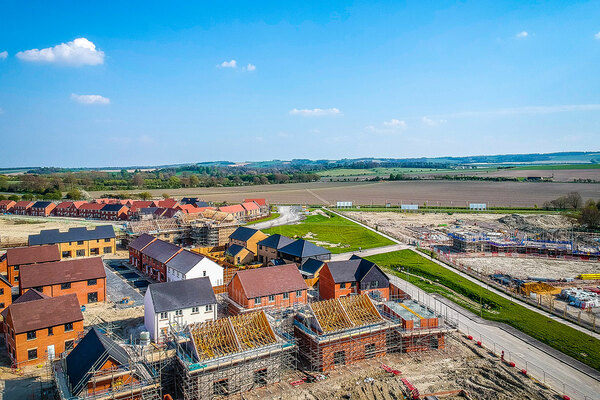You are viewing 1 of your 1 free articles
Why has the government chosen this moment to chuck a massive rock into the pond?
The new shared ownership changes increase uncertainty and may ultimately result in fewer homes for more money with little tangible benefit. At a time when the market needs certainty like never before, it is a reckless move, writes Matthew Bailes
Clearly there is a significant risk that house prices will soon fall, perhaps substantially. The scale of the recession, growing unemployment, the continuing threat from coronavirus, Brexit and the lack of wriggle room on interest rates all point in the same direction.
We know that if prices fall, developers will slow down or stop building new homes. Continuing to invest in a product that is likely to make a loss makes no sense. This in turn means that the supply chain will be stood down and many jobs will be lost. We also know that once capacity in the supply chain has gone, it can take many years to return.
A potential loss of economic activity, increased unemployment, lower tax revenue, a higher benefits bill and a loss of medium-term sector capacity would be bad news at any time. Given that we are in the midst of a record-breaking recession and public sector debt is at war-time levels, one would have thought the government would view it as a disaster.
There are one or two signs – for instance on the Help to Buy and the stamp duty holiday – that the government understands the problem.
But there are also plenty of signs that it really does not. Given the context, a major overhaul of the planning system to an unspecified timescale and with a lot of missing detail is risky. Some of the associated short-term measures are completely counterintuitive. First Homes will increase developers’ exposure at the expense of a solid receipt from affordable housing providers, including for products such as social and affordable rent that are largely immune from the whims of the market.
The government’s approach on funding for affordable homes is even more baffling. If the focus was on economic activity and jobs, it would have done what it could to reduce uncertainty and increase investment in sub-market rent.
It has done pretty much the opposite. Given that grant is not currently available for homes which complete after March 2022, the prospectus is very late. This means that numbers will inevitably dip.
And rather that increase certainty, the government has chosen this moment to chuck a massive rock in the pond in the form of profound changes to the shared ownership model, linked to new obligations to offer renters a right to buy on new shared ownership terms.
The current affordable housing model relies on margins on shared ownership to cross-subsidise sub-market rent. That cross-subsidy, along with cross-subsidy from outright sale, was already at risk given market conditions.
Obliging providers to pay for repair costs for 10 years, accept sales on tranches as low as 10% and, presumably, bind themselves to agreed prices on future staircasing will erode any margin still further – almost certainly to a point where without significantly more subsidy, shared ownership won’t stack up. And the final details won’t be available for months, which risks more delays.
The policy also begs some neat questions about existing deals, for example on long-term Section 106 schemes that might deliver completions in three to four years’ time. Will buyers still want to buy on the ‘old’ shared ownership terms and will lenders (and their valuers) support them? If not, are providers going to lose money on those schemes too or are we going to try to negotiate lower prices with developers?
Since delivery of rented products is so bound up in shared ownership margins, these problems have the potential to undermine supply of these homes as well, even before one considers the issues around the right to shared ownership, for example around charging.
This all seems quite bizarre – so what is going on?
It is not a great surprise to me that new ministers have come up with some exotic schemes. This happens all the time. And one can see the (flawed) logic that starts by saying the right to shared ownership is important, then concludes that it won’t be taken up by many unless the shared ownership offer is more generous, and therefore ultimately leads to these proposals.
But what I find staggering is that the Treasury allowed this flight of fancy to go ahead. Given that the new model requires more subsidy, the best it can achieve is fewer homes with the grant pot available and limited damage to Section 106 developments despite lower receipts for shared ownership. At worst, it could greatly reduce and delay the number of new starts. So the question is not whether there will be fewer jobs and lower tax receipts, but just how much will be lost.
Swapping these benefits for some intangible gains for a small number of future owners is not something the Treasury I worked with would have stomached. Perhaps this is a by-product of Number 10 asserting control over Treasury advisors? No wonder Sajid Javid was worried.
I guess it is not impossible that government will change its mind, given its recent track record. If it does not, like other providers, Paradigm will try to make the best of it. The one thing that hasn’t changed is our moral obligation to build new affordable homes.
But I fear we will be able to do less, especially as there are plenty of other calls on resources, including (if rumours are correct) a new requirement for all homes to reach EPC C standards by 2030. We will only get clarity on that when the government publishes its much-delayed Social Housing White Paper.
Some of us used to joke that the regulator’s sector risk profile could be boiled down to one word – government. The joke isn’t funny anymore.
Matthew Bailes, chief executive, Paradigm
Sign up for our daily newsletter
Already have an account? Click here to manage your newsletters














